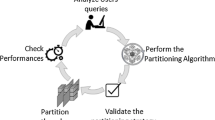Abstract
OLAP databases remain the first choice of enterprises to store and analyze huge amount of data. Thereby, to further enhance query performances and minimize the maintenance cost, many techniques exist, among which data partitioning is considered as an efficient technique to achieve this purpose. Although most of business intelligence tools support this feature, defining an appropriate partitioning strategy remains a big challenge. Hence, many approaches have been proposed in the literature. Nevertheless, most of them have been evaluated only in relational model. Therefore, we propose in this paper, a comparative study between our partitioning approach based on the association rules algorithm and a genetic based one. The study aims to compare the results of the aforementioned approaches in case of OLAP partitioning.
Access this chapter
Tax calculation will be finalised at checkout
Purchases are for personal use only
Similar content being viewed by others
References
Inmon, W.H.: Building the Data Warehouse. Wiley, Hoboken (2005)
Ponniah, P.: Data Warehousing Fundamentals: A Comprehensive Guide for IT Professionals. Wiley, Hobokens (2001)
Letrache, K., El Beggar, O., Ramdani, M.: The automatic creation of OLAP cube using an MDA approach. Softw.: Pract. Exp., 117 (2017). https://doi.org/10.1002/spe.2512
Bellatreche, L., Boukhalfa, K.: An evolutionary approach to schema partitioning selection in a data warehouse. In: Tjoa, A.M., Trujillo, J. (eds.) DaWaK 2005. LNCS, vol. 3589, pp. 115–125. Springer, Heidelberg (2005). https://doi.org/10.1007/11546849_12
Bellatreche, L., Boukhalfa, K., Richard, P.: Referential horizontal partitioning selection problem in data warehouses: hardness study and selection algorithms. Int. J. Data Warehous. Min. 5(4), 1–23 (2009)
Bellatreche, L., Boukhalfa, K., Richard, P.: Data partitioning in data warehouses: hardness study, heuristics and ORACLE validation. In: Song, I.-Y., Eder, J., Nguyen, T.M. (eds.) DaWaK 2008. LNCS, vol. 5182, pp. 87–96. Springer, Heidelberg (2008). https://doi.org/10.1007/978-3-540-85836-2_9
Amirat, H., Boukhalfa, K.: A data mining-based approach for data warehouse optimisation. In: ICA2IT International Conference on Artificial Intelligence and Information Technology (2014)
Bouchakri, R., Bellatreche, L., Faget, Z., Bre, S.: A coding template for handling static and incremental horizontal partitioning in data warehouses. J. Decis. Syst. 23(4), 481–498 (2014)
Toumi, L., Moussaoui, A., Ugur, A.: EMeD-part: an efficient methodology for horizontal partitioning in data warehouses. In: ACM IPAC 2015, Batna, Algeria (2015)
Sun, L., Krishnan, S., Xin, R.S., Franklin, M.J.: A Partitioning Framework for Aggressive Data Skipping. In: International Conference on Very Large Data Bases, Hangzhou, China (2014)
Arres, B., Kabachi, N., Boussaid, O.: A data pre-partitioning and distribution optimization approach for distributed datawarehouses. In: Proceedings of the International Conference on Parallel and Distributed Processing Techniques and Applications (PDPTA), Athens, pp. 454–461 (2015)
Kim, J.W., Cho, S.H., Il-Min, K.: Workload-based column partitioning to efficiently process data warehouse query. Int. J. Appl. Eng. Res. 11(2), 917–921 (2016)
Meta Data Coalition Open Information Model Version 1.1, August 1999
Han, J., Kamber, M.: Data Mining: Concepts and Techniques, 2nd edn. Elsevier Inc, Amsterdam (2006)
Agrawal, R., Imielinski, T., Swami, A.: Mining association rules between sets of items in large databases. In: Proceedings of the 1993 ACM SIG MOD Conference, Washington DC, USA, May 1993 (1993)
Mitchell, M.: An Introduction to Genetic Algorithms. A Bradford Book. The MIT Press, Cambridge (1999)
TPC-DS database. http://www.tpc.org/tpcds. Accessed 21 Nov 2017
Author information
Authors and Affiliations
Corresponding author
Editor information
Editors and Affiliations
Rights and permissions
Copyright information
© 2019 Springer Nature Switzerland AG
About this paper
Cite this paper
Letrache, K., El Beggar, O., Ramdani, M. (2019). Comparative Analysis of Our Association Rules Based Approach and a Genetic Approach for OLAP Partitioning. In: Podelski, A., Taïani, F. (eds) Networked Systems. NETYS 2018. Lecture Notes in Computer Science(), vol 11028. Springer, Cham. https://doi.org/10.1007/978-3-030-05529-5_28
Download citation
DOI: https://doi.org/10.1007/978-3-030-05529-5_28
Published:
Publisher Name: Springer, Cham
Print ISBN: 978-3-030-05528-8
Online ISBN: 978-3-030-05529-5
eBook Packages: Computer ScienceComputer Science (R0)




